The making of Path of Exile
How Grinding Gear Games created a free-to-play classic.
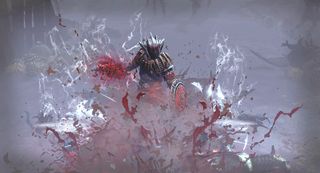
This article was originally published in PC Gamer UK issue 331. For more quality articles about all things PC gaming, you can subscribe now in the UK and the US.
When Chris Wilson was called a noob in his own game, Path of Exile, he knew it was going places.
Before the Grinding Gear Games co-founder had gone to bed, on the first night of Path of Exile's closed alpha test, he was running the highest level character in the game. When he woke up, he had the privilege of being insulted by the player who deposed him.
"The thing we were worried about with our closed alpha was whether or not people would actually keep playing overnight,” Wilson recalls. “This was basically us inviting our friends and family to play, and they’d play for a few hours to humour us. But if this person was willing to call in sick the next day and not go to work because he could be the number one player in the world in this upcoming action-RPG, which was his goal, then we had something.”
Back then Path of Exile fizzled out in the prison sequence of Act One. Now, several years of free expansions later, it’s one of the best value PC games around. That initial player vigil turned out to be the first act of worship for a fanbase that now plays the action-RPG in the hundreds of thousands. But Wilson and his team almost didn’t make it. Success nearly killed Path of Exile.
Like the exiles arriving in Wraeclast, Grinding Gear Games had to bring about order where there was none. The handful of established studios that existed in New Zealand at the time were not in contact with the five friends working out of Wilson’s garage. Potential hires would arrive in suits, and be walked past the embarrassed team’s laundry for their interviews. There was a budget, but it was tighter than the tighty-whities.
“Our goal was to be smart,” Wilson says. “We wanted from the beginning to write code that could do the work, rather than put people on it. We planned, for every asset we made, to use it five different ways. We made sure that we leaned heavily on random item generation and monster properties. We wanted to write our networking code once and get it right.”
The biggest gaming news, reviews and hardware deals
Keep up to date with the most important stories and the best deals, as picked by the PC Gamer team.
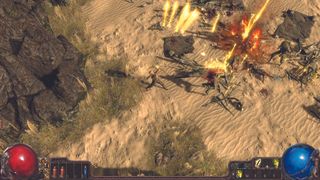
Frugality shaped the initial version of Path of Exile. Meanwhile, in California, another team was working on a rival action-RPG with a far larger budget. “I met one of my two co-founders playing Diablo II online,” Wilson says. “There had been no Diablo game for six years at that stage, no sign of anything on the horizon.”
Hardcore action-RPG
When Diablo III was announced, it was a cause for alarm—but Wilson and his team found solace in humongous shoulder pads. That World of Warcraft-like touch to Blizzard’s barbarian class reassured Grinding Gear that its chief rival was taking the genre-dominating series in a more accessible direction. In doing so, Blizzard had unknowingly left space for a gothic, hardcore action-RPG from New Zealand. It was the first potentially fatal blow Path of Exile had dodged.
“If they had made Diablo III as a very direct Diablo II sequel, I suspect the timeline would have gone quite differently,” Wilson says. “But thankfully, that differentiation meant that we had a slice of the market that we could explore and double down on.”
In the years since, Diablo III has not only survived a disastrous launch but recovered the series’ reputation. Yet Grinding Gear has discovered that life isn’t so bad in the shade cast by its looming genre mate.
“The effect we noticed was basically that every time we were mentioned in the media alongside Diablo III, it had a large positive impact on us,” Wilson says. “We’ve realised that in a genre like this where there’s a heavyweight able to get a lot of marketing for its own games, it’s a rising tide that lifts all ships. And if Blizzard eventually announces another product in that franchise it will probably be good for all action-RPGs, because it will bring attention back onto the genre.”
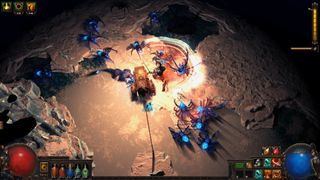
Grinding Gear made Path of Exile public for a weekend during Diablo III’s launch to drum up interest—and in early 2013, they began open beta. After running the game with a few thousand paying players, the studio didn’t know how many would show up on the shores of Wraeclast now the game was free-to-play. “This was the scary point,” Wilson says. “We knew it could be a lot more—potentially tens of thousands.”
In the event, nearly 80,000 testers played concurrently. It was the outcome the studio had hoped for, and it was horrendous. Support tickets flooded in as server problems emerged, fielded by just 20 developers at the time.
“It turned to hard mode immediately,” Wilson says. “Because now we’re expected to run a full-on games-as-a-service thing. Nowadays, we have dozens of people that handle all that stuff to make it seamless. But it’s tricky to decide to expand before you need it, because that feels like wasting money at the time.”
Staffing up wasn’t a simple process. With a lack of experienced developers in the local area to pull from, Grinding Gear would have to make time to train new hires—time it no longer had. “There were a lot of sleepless nights and learning the hard way,” Wilson says, “as you do when the servers just keep crashing.”
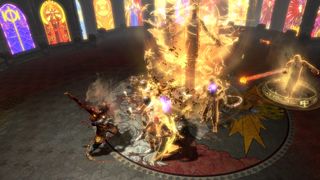
Real-time strategising
The exhaustion is still audible in Wilson’s voice when he talks about that period in Path of Exile’s history. His life felt a little like an RTS—how could he spend his limited resources in order to save Grinding Gear HQ from being overwhelmed? If the team didn’t develop the game fast enough, the players would leave. If it crashed too often, the players would leave. If support couldn’t reply to customer tickets fast enough, or there was a community disaster the team didn’t address, the players would leave.
“Trying to tackle all the problems at once, with constrained resources, and also still sleep when there’s an eight hour period where we’re not able to solve those problems? It’s an interesting physiological challenge,” Wilson says.
Eventually Grinding Gear’s enemy had a name: desync. When the studio had built Path of Exile, it had plumped for a predictive networking model. Every time you attacked an enemy or moved an item, the game checked in with the server to make sure you weren’t cheating. And in the meantime, your PC assumed the check had worked—allowing you to hack and slash as if you were enjoying a single-player game, with no lag. This step was particularly important in the early years of the game, when servers were further behind than Grinding Gear would have liked, leading to slower checks.
The problem arose when your PC drifted out of sync with reality as the server saw it—leaving you unable to trust what you were seeing on your monitor. Advanced players in particular were constantly out of sync in ways that endangered their characters as they zipped back and forth across the screen.
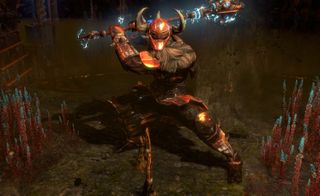
For a long time, if you saw a positive comment about Path of Exile, it was often accompanied by a reply in which someone would bring up desync. “It became the thing where, if there was a good Reddit thread about Path of Exile, half the users were loving it and the other half were saying, ‘I quit because of desync’,” Wilson says. “It was a game-killing problem from that point of view.” Even as the game grew in size and strength, the team worried that one day, the albatross around their necks would sink them.
“That problem plagued us for years,” Wilson says. “The way to solve it involved a lot of math, months of work, and a whole team. Thankfully it’s a thing of the past—I haven’t seen a player mention the word in more than a year.”
Grinding Gear finally banished desync with the release of Path of Exile 2.0.0 in 2015. Now Wilson worries about how often he sees players complain about clunky combat animations. “It’s true that we have a complete redo of all that stuff coming, but again, it’s a long-term project slated for next year,” he says. While running a live game, there’s no plateau the studio can climb to that truly allows them rest. The grind never ends.
That fact is reflected in the rigorous update cadence the studio has devised for the game. “Prior to 2015, and this isn’t something I’ve talked about a lot publicly, but our releases were not growing the overall community,” Wilson says. “We released the game and each of the expansions we released did OK, and sometimes went up and sometimes went down. The money was great, and it was awesome to have made a successful game. But at the same time, it wasn’t growing.”
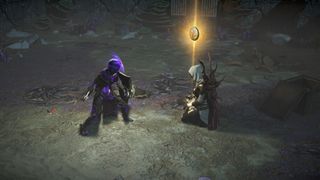
Grinding Gear’s angel investors, who had helped fund the game, weren’t applying any pressure. And so it became a question for the studio itself to answer—did they want to try and be the next League of Legends, and how would they achieve that if they did?
If you’ve logged into Steam anytime in the last three years, you’ll know that not only did Grinding Gear decide to take over the world, but that it’s succeeding. Since the team adopted a rigid 13-week schedule, they’ve seen a 20 per cent increase in players with the release of each league—Path of Exile’s take on Diablo’s seasons. It’s a reversal of the industry standard, in defiance of the trajectory that even the likes of World of Warcraft has suffered.
“Path of Exile’s been out for about six years and we’re still seeing new records,” Wilson says. “Our highest month was December. We’re expecting to see more records broken in the next couple of years, especially with the massive 4.0.0 coming out next year.”
The swift turnover on expansions has helped, paradoxically, with keeping hold of the staff the studio so desperately needs—Grinding Gear is still something of an island as a PC game developer in New Zealand.
“We want people to be constantly working on varied stuff,” Wilson says. “We make sure they have mobility within the company, and that every moment of overtime that’s asked for is both paid at a higher rate, and also seen as a management failure so that we can make sure to minimise that as much as possible.”
Players' health

Perhaps it shouldn’t be a surprise that an action-RPG developer can see the benefits of a commitment to staff welfare, eyeing the long-term reward beyond the immediate grind of the next expansion milestone. It’s heartening to learn that several of Grinding Gear’s staff have been around for more than a decade, and that all of its founders are still with the company. “People are seeing it as a lifelong commitment,” Wilson says.
What is surprising—in that I’ve never heard a game developer ever mention the concept before—is that the studio is starting to consider the long-term impact of the game on their players’ lives as well.
“Some of our players put in a lot of hours each day—eight, ten, 12 hours,” Wilson says. “And that often comes at the expense of their real-world progress, right? Because of this, they’re potentially even unhappy about their achievements in the real world. So it’s very important that they can feel incredibly good about the fact they’ve achieved so much cool stuff within our game.”
It’s for that reason you don’t see as much power inflation in Path of Exile as in some comparable MMOs—where you might find a beginner weapon in a new expansion that makes the one you spent hundreds of hours raiding for look a bit silly.
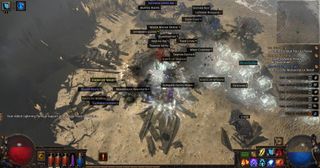
“People talk about how it feels satisfying to shatter a whole screen of enemies at once,” Wilson says. “But a lot of our core designers want the real satisfaction, deep down, to be that you found something awesome that you can then go home and load up on your screen and look at. You’re able to trade it to someone else if you want to, but you don’t want to because it’s yours, but you could give it to them, but you’re not going to. Path of Exile players are heavily, heavily encouraged to care very deeply about the things they’ve accomplished on the game.”
It’s a tribute to Path of Exile’s uniquely enduring success that its studio is having to worry about where its players aren’t grinding elsewhere in their lives—and testament to Grinding Gear that the studio takes the problem seriously. It didn’t have to. But in Wraeclast, the only justice is the one exiles make for themselves.
Most Popular

